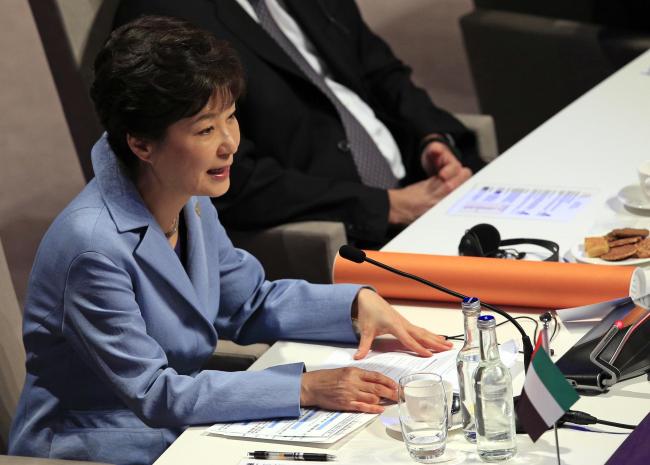
South Korean President Park Geun-hye appealed to global leaders Monday that ending North Korea's nuclear program should be the first step toward an ambitious vision to make the world safer without nuclear weapons.
Park issued the appeal during a speech at the opening ceremony for the Nuclear Security Summit in The Hague, saying Pyongyang's pursuit of atomic bombs poses grave threats to world peace because nuclear material from the communist nation could end up in the hands of terrorists.
Park also voiced concerns about possible safety problems in the North's main nuclear complex in Yongbyon, north of Pyongyang, the capital. She said that a fire in a building in the complex could lead to a disaster worse than the 1986 Chernobyl nuclear disaster.
"As long as North Korea remains a nuclear challenge, a world without nuclear weapons will not come," Park said in the speech.
"It has been my long-held conviction that the journey toward a world without nuclear weapons should start from the Korean Peninsula."
The conference brought together leaders of 53 countries around the world and four international organizations. Park delivered the speech as head of the chair country of the previous summit. Seoul hosted the biennial conference in 2012 after the United States launched the forum in 2010.
Dutch Prime Minister Mark Rutte and U.N. Secretary-General Ban Ki-moon also made speeches.
Park said that the Nuclear Security Summit process has produced significant progress over the past four years, including the removal of more than 3,000 kilograms of weapons-grade nuclear material, which is worth about 120 atomic bombs.
But the world has a long way to go to end threats of nuclear terrorism, she said.
"No country is free from the threat of nuclear terrorism. A single act of nuclear terrorism will have catastrophic consequences for the entire world," Park said.
"One cannot overstate the importance of the 53 states gathered here today. For together, these countries hold the vast majority of the world’s nuclear materials and operate 97 percent of the world's nuclear power plants," she said.
Park said the world still has enough nuclear materials to build over 110,000 nuclear weapons.
She made a four-point proposal to reduce threats of nuclear terrorism, including the signing of an international treaty, the Fissile Material Cutoff Treaty (FMCT), which calls for prohibiting the further production of fissile material for nuclear weapons.
Other points included building regional mechanisms for nuclear security, narrowing the gaps in nuclear-security capabilities between well-off countries and others and coming up with measures to cope with cyber terrorism against nuclear facilities.
Park arrived in The Hague on Sunday and held talks with Chinese President Xi Jinping later in the day. The two leaders reaffirmed that a nuclear North Korea is unacceptable and agreed to cooperate closely to restart six-party denuclearization talks and conclude bilateral free trade negotiations at an early date.
On Monday, Park met with the Dutch prime minister and discussed ways to bolster economic cooperation and exchanges between the two countries. After the talks, the two leaders also attended a signing ceremony for a "working holiday" program agreement.
While in The Hague, Park is also scheduled to hold a three-way meeting with U.S. President Barack Obama and Japanese Prime Minister Shinzo Abe for talks on how to deal with nuclear and other threats from North Korea.
The planned meeting is a subject of keen media attention because it would mark the first formal talks between Park and Abe since they took office more than a year ago and could signal a thaw in badly frayed ties between Seoul and Tokyo. (Yonhap)







![[Hello India] Hyundai Motor vows to boost 'clean mobility' in India](http://res.heraldm.com/phpwas/restmb_idxmake.php?idx=644&simg=/content/image/2024/04/25/20240425050672_0.jpg&u=)










